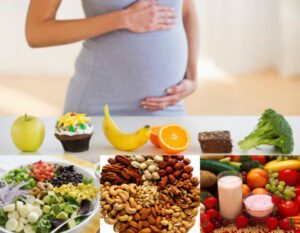The importance of Balanced Diet in Pregnancy is of utmost importance for both the mother and the developing baby bringing a new life into the world is a miraculous journey especially when it comes to nutrition. Pregnancy is a time of significant physiological changes for both the mother and the developing baby. As such, maintaining a balanced diet during pregnancy is paramount to ensure optimal health outcomes for both.
Ensuring Optimal Health through a Balanced pregnancy diet:
A balanced diet in pregnancy plays a crucial role in supporting the healthy development of the baby while also ensuring the well-being of the mother. A balanced diet provides essential nutrients such as folate, iron, calcium, and protein, which are vital for fetal growth and development. It also helps prevent complications during pregnancy, such as neural tube defects, low birth weight, and preterm birth.

The 5 Essential Benefits of Balanced Diet in Pregnancy:
1. Promotes Baby Development: Balanced Diet for Optimal Fetal Growth:
A well-balanced diet supplies the necessary nutrients for the baby’s growth and development, including brain development, bone formation, and organ function.
2. Supports Maternal Health:
With a Proper nutrition and balanced diet during pregnancy helps reduce the risk of gestational diabetes, preeclampsia, and other pregnancy-related complications. It also aids in maintaining healthy weight gain throughout pregnancy.
3. Enhances Energy Levels:
Eating nutritious foods and maintaining proper balanced diet provides expecting mothers with the energy they need to cope with the physical demands of pregnancy and prepare for childbirth.
4. Boosts Immune Function:
Nutrient-rich foods and healthy pregnancy snacks strengthen the immune system, helping to defend against infections and illnesses that can pose risks to both mother and baby.
5. Managing Weight and Preventing Complications:
Maintaining a balanced diet can help manage weight gain during pregnancy and reduce the risk of complications such as gestational diabetes and preeclampsia. Consuming nutrient-dense foods in appropriate portions helps regulate blood sugar levels and blood pressure, promoting overall maternal health and well-being.
What to Eat While Pregnant:
A healthy pregnancy diet should include a variety of nutrient-dense foods from all food groups. Focus on incorporating:
- Fruits and vegetables for vitamins, minerals, and fiber.
- Whole grains for energy and fiber.
- Lean proteins such as poultry, fish, beans, and nuts.
- Dairy products for calcium and protein.
- Healthy fats from sources like avocados, nuts, and olive oil.

What Not to Eat While Pregnant:
While it’s essential to consume nutritious foods during pregnancy, certain items should be avoided or limited to ensure the safety of both mother and baby. These include:
- Raw or undercooked meats, fish, and eggs.
- Unpasteurized dairy products.
- High-mercury fish.
- Excessive caffeine and alcohol.
- Processed foods high in sugar and unhealthy fats.
What are healthy Pregnancy Snacks for pregnant women:
Taking healthy pregnancy snacks during pregnancy is very important, nourishing snacks such as:
- Greek yogurt with fruit.
- Whole grain crackers with cheese.
- Nut butter on whole wheat toast.
- Fresh fruit or vegetable slices.
- Homemade smoothies with leafy greens and berries.
Pregnancy Food Cravings and balanced diet:
Many women experience intense pregnancy food Cravings for specific foods. These cravings can range from sweet treats to savory delights and often vary throughout the different stages of pregnancy. Understanding the reasons behind these cravings and learning how to manage them is essential for maintaining a balanced diet and promoting overall well-being for both you and your baby.
Why Pregnancy Food Cravings Occur?
Nutrient Deficiencies and Cravings:
While the exact reasons behind pregnancy cravings are not fully understood, hormonal changes and nutritional deficiencies might play a role. According to the American College of Obstetricians and Gynecologists (ACOG), some cravings may indicate a need for specific nutrients. For instance, craving red meat might signal a need for more iron in your diet. Consulting a healthcare professional or registered dietitian can help you create a personalized plan to address any potential deficiencies.
Managing Pregnancy Food Cravings:
While it’s okay to indulge in cravings occasionally, it’s essential to maintain a balanced diet to ensure you’re getting all the nutrients you and your baby need. Here are some tips for managing pregnancy food cravings:
1. Importance of hydration in pregnancy:
The importance of hydration in pregnancy underscores the significance of staying well-hydrated, particularly as thirst signals can sometimes be mistaken for hunger or cravings. It’s essential to drink plenty of water throughout the day to maintain hydration levels, which not only reduces cravings but also supports optimal maternal and fetal health during pregnancy.
2.Option for Healthy: Alternatives:
If you’re craving something sweet, reach for a piece of fruit instead of sugary snacks. Choose whole-grain crackers or nuts as satisfying alternatives to processed junk foods.
3.Practice Moderation:
Allow yourself to indulge in cravings occasionally, but practice moderation. Enjoy a small portion of your desired treat without overindulging.
4. Listen to Your Body:
Pay attention to your body’s signals and cravings. Cravings can sometimes indicate a need for specific nutrients. For example, craving red meat might signal a need for more iron in your diet.
5. Plan Balanced Meals:
Focus on incorporating a variety of nutrient-dense foods into your meals to help curb cravings and keep you satisfied for longer periods.
6. Seek Support:
Talk to your healthcare provider or a nutritionist if you’re struggling with intense or persistent cravings. They can provide guidance and support to help you healthily manage cravings.
FAQs:
1. Why is a balanced diet important in pregnancy?
A balanced diet provides essential nutrients that support the health and development of both the mother and the baby during pregnancy. It helps prevent nutritional deficiencies and reduces the risk of complications.
2. What nutrients are important during pregnancy?
Nutrients during pregnancy play a vital role including folic acid, iron, calcium, protein, vitamins, and minerals. It helps in fetal growth and development, as well as maternal health.
3. How does a balanced diet support fetal development?
A balanced diet provides the necessary nutrients for proper fetal growth and development. Nutrients like folic acid help prevent neural tube defects, while iron supports red blood cell production and oxygen transport to the fetus.
4. Can I follow a vegetarian or vegan diet during pregnancy?
Yes, it is possible to follow a vegetarian diet during pregnancy, but it requires careful planning to ensure adequate intake of essential nutrients such as protein, iron, calcium, and vitamin B12. Consult with a healthcare provider or a registered dietitian for personalized guidance.
5. What foods should I avoid during pregnancy?
Certain foods should be avoided or limited during pregnancy due to the risk of foodborne illnesses or potential harm to the baby. These include raw or undercooked meats, unpasteurized dairy products, fish high in mercury, and foods containing excessive amounts of caffeine or added sugars.
6. How much weight should I gain during pregnancy?
Weight gain recommendations during pregnancy vary based on pre-pregnancy weight and individual health status. Generally, women with a healthy pre-pregnancy weight are advised to gain between 25-35 pounds during pregnancy. However, specific references should be discussed with a healthcare provider.
7. What if I have nausea during pregnancy?
Many women experience food aversions and nausea, especially during the first trimester of pregnancy. It’s essential to listen to your body and eat what feels tolerable. Focus on consuming small, frequent meals and snacks, and consider trying bland or easily digestible foods.
8. Can I continue to exercise while pregnant?
Yes, in most cases, exercise is harmless and valuable during pregnancy. Regular physical activity can help maintain overall health, manage weight gain, and alleviate common pregnancy discomforts. However, it’s important to consult with a healthcare provider before starting or modifying an exercise routine during pregnancy.
Conclusion:
In conclusion, the importance of balanced diet in pregnancy cannot be emphasized enough. It is the cornerstone of a healthy pregnancy journey, providing essential nutrients for both mother and baby. By making mindful food choices and prioritizing nutrition, you can support optimal health and well-being throughout pregnancy and beyond.
By understanding the reasons behind your pregnancy food cravings and adopting healthy strategies to manage them, you can maintain a balanced diet and support the health and development of your baby throughout pregnancy. Remember, it’s essential to prioritize your well-being and nourish your body with nutritious foods during this transformative time.
External Resources:
American College of Obstetricians and Gynecologists (ACOG): https://www.acog.org/March of Dimes: https://www.marchofdimes.org/
Books:
What to Expect When You’re Expecting by Heidi Murkoff: This classic and comprehensive guide covers all aspects of pregnancy, including nutrition.
Real Food for Pregnancy: The Science and Wisdom of Optimal Prenatal Nutrition by Lily Nichols: This book dives deep into the science behind prenatal nutrition and provides practical advice for creating a healthy pregnancy diet.

Empowering parents to raise happy, confident kids. Get practical parenting tips and advice on our blog, Smart Parent Guides.
